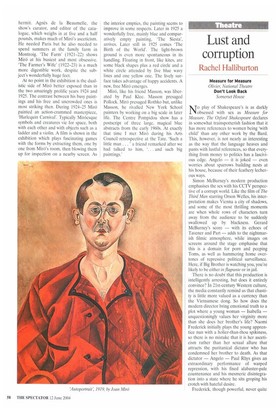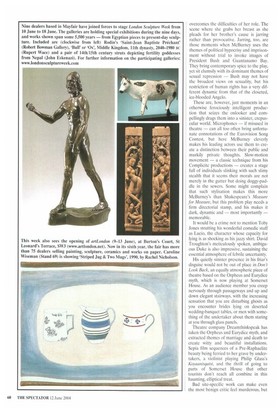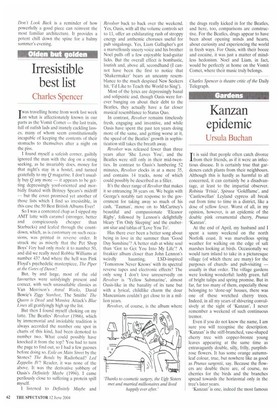Lust and corruption
Rachel Halliburton
Measure for Measure Olivier, National Theatre Don't Look Back Somerset House
N°play of Shakespeare's is as darkly obsessed with sex as Measure for Measure. The Oxford Shakespeare declares in somewhat trainspotterish fashion that it has more references to women being 'with child' than any other work by the Bard. This, however, is not nearly as interesting as the way that the language heaves and pants with lustful references, so that everything from money to politics has a lascivious edge. Angelo — it is joked — even worries about sparrows building nests at his house, because of their feathery lecherous ways.
Simon McBurney's modern production emphasises the sex with his CCTV perspective of a corrupt world. Like the film of The Third Man starring Orson Welles, his interpretation makes Vienna a city of shadows, and some of the most thrilling moments are when whole rows of characters turn away from the audience to be suddenly swallowed up by blackness. Gerard McBurney's score — with its echoes of Tavener and Part — adds to the nightmarish filmic atmosphere, while images on screens around the stage emphasise that this is a domain for porn and peeping Toms, as well as hammering home overtones of repressive political surveillance. Here, if Big Brother is watching you, you're likely to be either in flagrante or in jail.
There is no doubt that this production is intelligently arresting, but does it entirely convince? In 21st-century Western culture, the media constantly remind us that chastity is little more valued as a currency than the Vietnamese dong. So how does the modern director bring emotional truth to a plot where a young woman — Isabella — unquestioningly values her virginity more than she does her brother's life? Naomi Frederick initially plays the young apprentice nun with a holier-than-thou spikiness, so there is no mistake that it is her asceticism rather than her sexual allure that attracts the puritanical dictator who has condemned her brother to death. As that dictator — Angelo — Paul Rhys gives an extraordinary performance of warped repression, with his fixed alabaster-pale countenance and his mesmeric disintegration into a state where he sits groping his crotch with hateful desire.
Frederick, though powerful, never quite overcomes the difficulties of her role. The scene where she grabs her breast as she pleads for her brother's cause is jarring rather than provocative. Jarring, too, are those moments when McBurney uses the themes of political hypocrisy and imprisonment without trial to invoke images of President Bush and Guantanamo Bay. They bring contemporary spice to the play, yet sit clumsily with its dominant themes of sexual repression — Bush may not have the broadest views on sexuality, but his restriction of human rights has a very different dynamic from that of the closeted, ice-blooded Angelo.
These are, however, just moments in an otherwise ferociously intelligent production that seizes the onlooker and compellingly drags them into a sinister, crepuscular world. Microphones — if misused in theatre — can all too often bring unfortunate connotations of the Eurovision Song Contest, but here McBurney cleverly makes his leading actors use them to create a distinction between their public and murkily private thoughts. Slow-motion movement — a classic technique from his Complicite productions — creates a stage full of individuals slinking with such slimy stealth that it seems their morals are not merely in the gutter but doing doggy-paddle in the sewers. Some might complain that such stylisation makes this more McBurney's than Shakespeare's Measure for Measure, but this problem play needs a firm directorial stamp, and his makes it dark, dynamic and — most importantly — memorable.
It would be a crime not to mention Toby Jones strutting his wonderful comedic stuff as Lucio, the character whose capacity for lying is as shocking as his jazzy shirt. David Troughton's meticulously spoken, ambiguous Duke is also impressive, sustaining the essential atmosphere of febrile uncertainty.
His quietly sinister presence in his friar's disguise would not be out of place in Don't Look Back, an equally atmospheric piece of theatre based on the Orpheus and Eurydice myth, which is now playing at Somerset House. As an audience member you creep nervously through passageways and up and down elegant stairways, with the increasing sensation that you are disturbing ghosts as you encounter brides lying on deserted wedding-banquet tables, or men with something of the undertaker about them staring at you through glass panels.
Theatre company Dreamthinkspeak has taken the Orpheus and Eurydice myth, and extracted themes of marriage and death to create witty and beautiful installations. Sepia film sequences of a Pre-Raphaelite beauty being ferried to her grave by undertakers, a violinist playing Philip Glass's Koyaanisqatsi, and the thrill of going to parts of Somerset House that other tourists don't reach all combine in this haunting, elliptical treat.
Bad site-specific work can make even the most benign critic feel murderous, but Don't Look Back is a reminder of how powerfully a good piece can reinvent the most familiar architecture. It provides a potent chill down the spine for a balmy summer's evening.




















































































 Previous page
Previous page